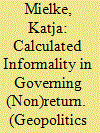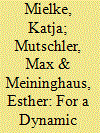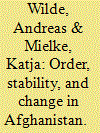|
|
|
Sort Order |
|
|
|
Items / Page
|
|
|
|
|
|
|
| Srl | Item |
| 1 |
ID:
191441


|
|
|
|
|
| Summary/Abstract |
Afghans’ protracted displacement is a geopolitical legacy from the Cold War. Although Pakistan’s return policymaking has foreseen the complete voluntary return of Afghans since the end of the Cold War, then as now, about three million Afghans reside in Pakistan. This article advances the notion of calculated informality to dissolve this seeming contradiction. Pakistan’s policymakers have excelled in calculated informality by successfully navigating the domestic and geopolitical arena over time based on practices of deregulation and ambiguity. Methodologically, the article applies Evolutionary Governance Theory (EGT) to reconstruct Pakistan’s return governance path based on the analysis of legal documents, previous research and secondary literature. EGT reveals the dependencies and layering at work in return governance and points out how the geopolitical positionality of Pakistan has determined its return policymaking. The structured interconnectedness of path-, goal- and interdependencies illustrates rigidities of the governance path and why opacity and ambiguity in return governance persist.
|
|
|
|
|
|
|
|
|
|
|
|
|
|
|
|
| 2 |
ID:
174333


|
|
|
|
|
| Summary/Abstract |
Stabilization is a contestable concept of intervention in violent conflicts. Often, it is either uncritically supported or rejected. In this article, we criticize current conceptualisations and practices of stabilization and newly introduce a dynamic approach for stabilization that yields a transformative potential. By distinguishing static vs. dynamic approaches to stabilization, we address the widespread dilemma that so-called stabilization measures seem unable to avoid instability and protracted violence in the long-term. Our analysis of the three policy fields peacekeeping, train & equip programmes and migration management in Mali reveals the dominance of static elements in stabilization practice. Instead, our article proposes to see a transformative variant of stabilization measures that enhances long-term security and development. We argue that there are two dynamic approaches of stabilization that policy-makers and practitioners can apply in (post-)conflict societies: state-centred liberal peacebuilding that takes its normative core seriously, and non-state centric peacebuilding that acknowledges alternative lived orders.
|
|
|
|
|
|
|
|
|
|
|
|
|
|
|
|
| 3 |
ID:
124152


|
|
|
|
|
| Publication |
2013.
|
| Summary/Abstract |
This article presents findings from long-term empirical fieldwork and archival research into current and historical patterns of governance in north-eastern Afghanistan, conducted between 2006 and 2009. Despite the long civil war, striking continuities have been found in the make-up and functioning of the local social order. Patron-client relations, eldership, and related practices of mediation are crucial structuring principles of rural society. They have dominated Afghan politics over centuries and still do today. Viewed from a long-term perspective, this continuity, related patterns of representation, and the role of middlemen and brokers suggest a certain degree of stability, in contrast to the popular perception of instability and disorder in this country. Whilst in the past the expansion of the state relied on tacit agreement between government administrators and local elites, resulting in state-making from above, the war broadly changed actors, regimes, and coalitions, but not the underlying mechanisms of the social order. Hence, today, the failure of the current state-building project can be attributed to the fact that the effects of these mechanisms are insufficiently recognized and grasped by Western actors and state-builders. We argue that local Afghan actors have captured the intervention from below. Instead of state-building, we are dealing here with state-making dominated by patronage networks.
|
|
|
|
|
|
|
|
|
|
|
|
|
|
|
|
|
|
|
|
|